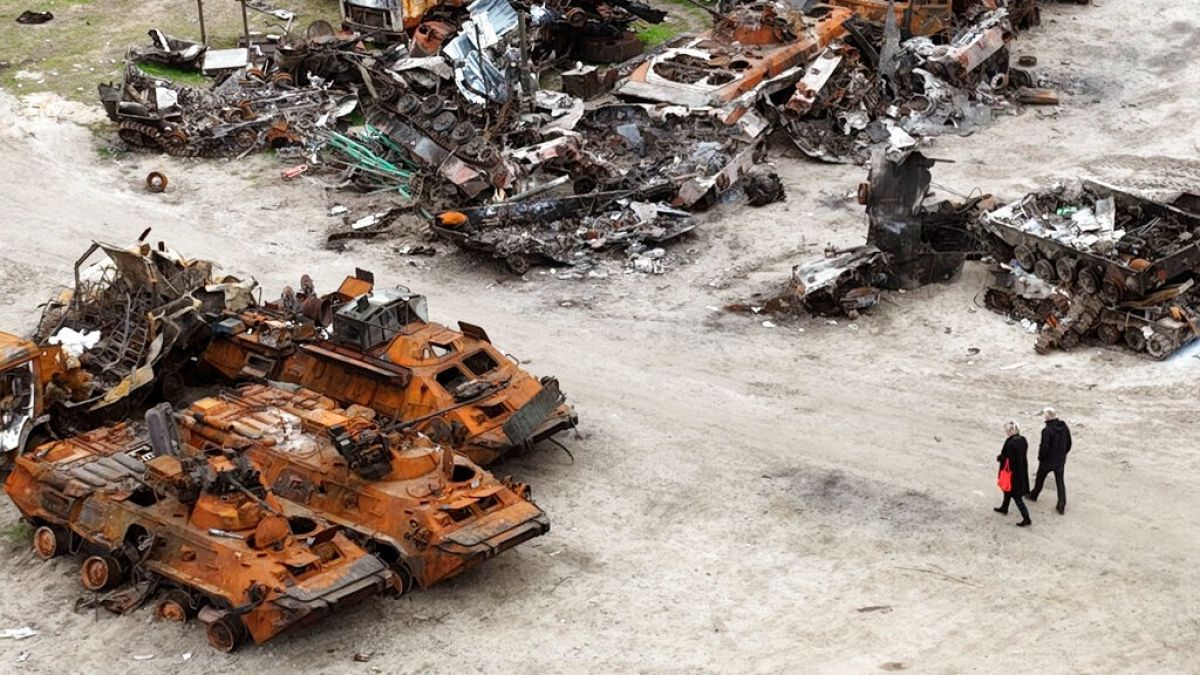Officials from Ukraine, Lithuania and Poland will discuss early findings with the International Criminal Court's lead prosecutor as thousands of potential war crimes cases are being pursued in Ukraine.
Representatives of a group of nations working together to investigate war crimes committed since Russia's invasion of Ukraine are meeting in The Hague today, amid ongoing calls for those responsible for atrocities to be brought to justice.
Tuesday's coordination meeting is taking place at the European Union's judicial cooperation agency, Eurojust, attended by members of a joint investigation team together with International Criminal Court prosecutor Karim Khan.
The invasion of Ukraine has been widely condemned as an illegal act of aggression. Russian forces have been accused of massacring civilians in the Kyiv suburb of Bucha and of rape and sexual assault of women and girls in occupied towns.
Russian troops have also been charged with carrying out repeated attacks on civilian infrastructure, including hospitals, a theatre in the besieged city of Mariupol being used as a shelter, and Kramatorsk railway station, where hundreds of civilians were trying to leave.
An investigation by The Associated Press found evidence that the March 16 bombing of the Mariupol theatre killed close to 600 people inside and outside the building.
Ukrainian President Volodymyr Zelenskyy has denounced the apparent targeting of civilians as “genocide” and war crimes. US President Joe Biden has also called Russian President Vladimir Putin “a war criminal” who should be brought to trial. Moscow denies its troops are responsible for any such acts.
A tough road ahead
The joint investigation team meeting on Tuesday includes officials from Ukraine, Lithuania and Poland. It was first set up in late March, a few weeks after the ICC opened an investigation in Ukraine backed by dozens of its own member states.
The ICC's Karim Khan has already visited parts of Ukraine, including Bucha, and has a team on the ground in the country gathering evidence.
Ukraine's prosecutor general, Iryna Venediktova, will reportedly be among those at the meeting. Her office has opened more than 8,000 criminal investigations related to the war and identified more than 500 suspects, including Russian ministers, military commanders and propagandists.
Last week, in the first case of its kind linked to the war, a Ukrainian court sentenced a captured Russian soldier to the maximum penalty of life in prison for killing a civilian.
Two more soldiers were sentenced on Tuesday to 11 and a half years for their part in the shelling of an educational establishment in the town of Derhachi, Kharkhiv Oblast.
Analysts, however, warn that the process of meting out justice will be long and complex. Investigators need to not only piece together forensic and other evidence, but seek to establish who ordered or knew about atrocities and failed to act to prevent or punish them: known as those with 'command responsibility'.
The meeting in The Hague isn't the only place accountability is being sought. Prosecutors in Poland, Germany, Lithuania, Latvia, Estonia, France, Slovakia, Sweden, Norway and Switzerland have opened investigations of their own.
There have also been growing calls to set up a special tribunal to try Russia for the crime of aggression in Ukraine. The ICC can't prosecute this itself because neither Russia nor Ukraine are members of the court.
